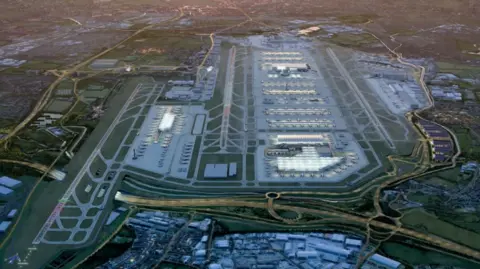Heathrow Airport, one of the busiest airports in the world, has publicly announced an ambitious expansion plan poised to cost £49 billion. This significant investment is aimed at modernizing the airport’s current infrastructure over the next decade. The expansion is touted as a necessary response to the airport reportedly operating at full capacity, impacting trade and connectivity. Thomas Woldbye, the CEO of Heathrow Airport, emphasized the urgency of the expansion, highlighting that it would be funded through private finance.
The proposal has garnered government support, notably from Chancellor Rachel Reeves, who asserts that the addition of a third runway could position Britain as the world’s best-connected hub for business. However, the expansion plans are already facing substantial pushback from environmental activists, local politicians, and residents. London’s mayor, Sir Sadiq Khan, expressed deep concerns regarding potential noise pollution, increased air contamination, and the broader implications for London’s climate objectives.
Interestingly, these plans were unveiled shortly after a government deadline for submission of proposals, illuminating the competitive nature of infrastructural developments. Heathrow’s blueprint not only includes a third runway, dubbed the “North-Western Runway,” which would extend up to 3,500 meters (11,500 feet), but also a new terminal (T5X), regional rail enhancements, and improvements to local transport. The ambitious project aims to increase the airport’s capacity to accommodate 756,000 flights and serve 150 million passengers annually, a substantial leap from the 84 million that currently pass through the facility.
Financially, the breakdown of the expansion costs reveals a considerable investment in infrastructure: £21 billion for the third runway, £12 billion for the new terminal, and £15 billion for modernizing existing facilities. The overall enhancement is estimated to bolster the UK’s economy by 0.43% in GDP terms.
Business bodies, such as the Confederation of British Industry and the British Chambers of Commerce, have welcomed the plans, emphasizing their potential to open vital access to emerging markets, enhance domestic and international connectivity, and stimulate private investment across the country.
While expansion advocates focus on economic growth and connectivity improvements, considerable environmental concerns dominate the conversation. Woldbye noted that the expansion aligns with the aviation sector’s net-zero emissions target set for 2050. He highlighted Heathrow’s commitment to adopting Sustainable Aviation Fuel at a higher rate than any other airport worldwide, insisting that any legal emissions standards would need to be met before government approval.
Conversely, environmentalists criticize these assurances as insufficient. Dr. Douglas Parr from Greenpeace UK characterized the environmental rationale as mere marketing rhetoric, advocating for policies like a frequent flier levy to address pollution effectively. Sir Sadiq Khan has expressed skepticism, fearing that the projected increase in flights would create detrimental environmental impacts, stressing the need for a careful examination of how such expansion could impact transport infrastructure and local residents.
Opposition is also fueled by alternative proposals, such as one from the Arora Group, which suggests that a third runway could be created without necessitating changes to the M25 motorway, thereby reducing costs significantly. This proposal predicts that a smaller runway would be both practical and less disruptive, aiming to have its new runway operational by 2035.
The debate surrounding this development is not new. Historically, efforts to expand Heathrow’s operations have met with obstacles under various administrations, reflecting ongoing tensions between economic ambitions and environmental sustainability.
As plans move forward, Transport Secretary Heidi Alexander supports examining both Heathrow’s proposals and the Arora Group’s alternative in the context of stimulating national growth and infrastructure needs. He stressed the importance of thorough consideration over the coming months, signaling that careful scrutiny and public interest will play pivotal roles in any final decisions regarding the expansion. The complexity of opposing views illustrates the nuanced dynamics around Heathrow’s future and mirrors broader global challenges regarding development, environment, and societal implications.












